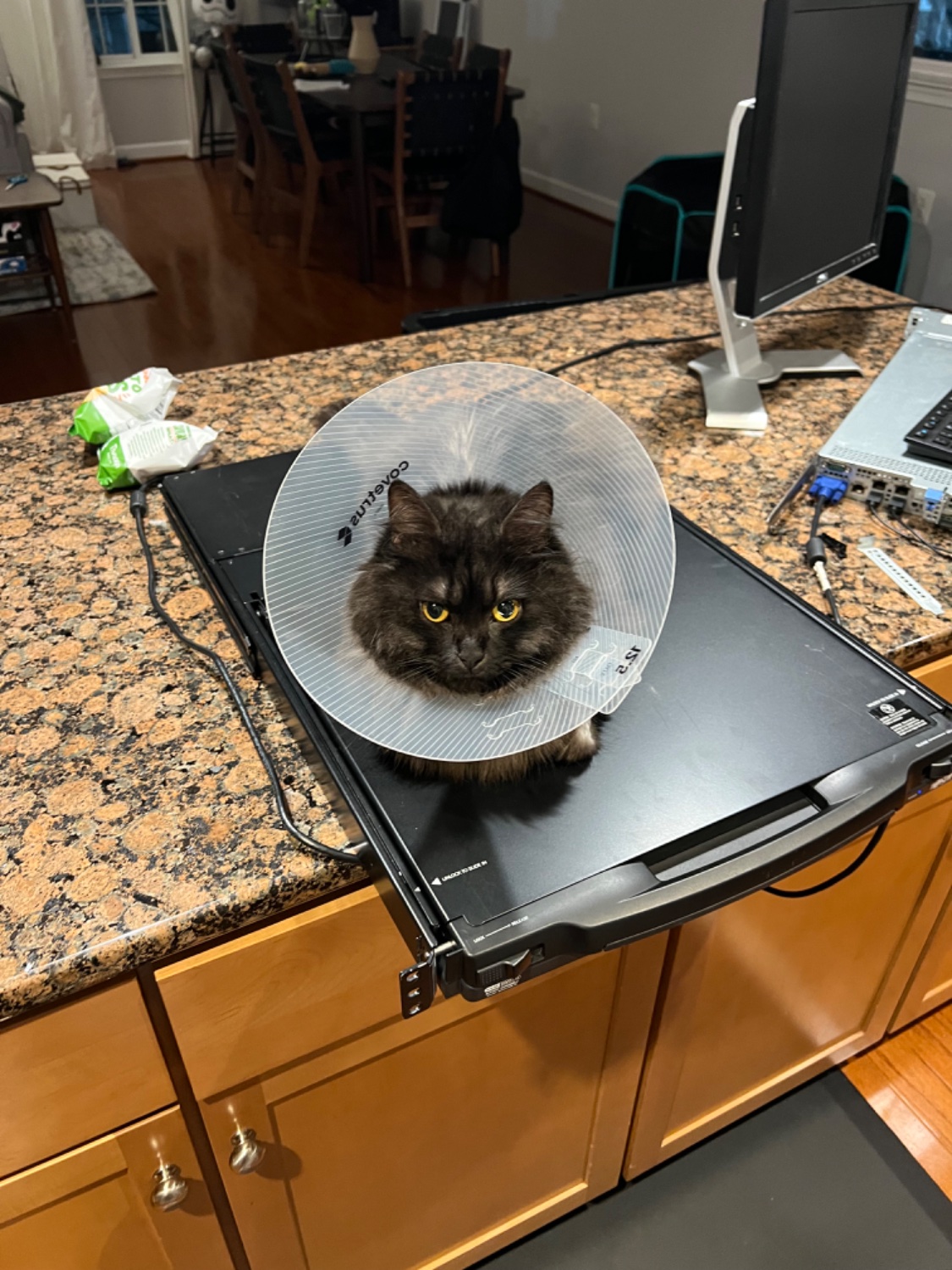KVMs are unreasonably expensive and my work was about to throw this one in the dumpster. I just need to order some console cables first but I’m really pleased.

My cat has claimed it as his own lol
I swear I see those old 1280x1024 monitors everywhere. I have one just like that at home. Also came from my dad’s old job
Mine came from Craigslist. It’s perfect for server stuff.
Work was throwing it out. Again and again.
Lord cat thanks you for your offering and expects more next week
Turn my bum warmer on, peasant!
Cat.
Now you can hack trains and airplanes and order air strikes!
KVM drawers are cool for homelab racks!
Who the hell removed it from the rack. That ear is at a 45-degree angle
If I had to guess it got damaged when transported in a box with hundreds of pounds of old servers stacked on top of it. Some of the other KVMs I saw were in pieces.
PiKVM for open source networked KVMs: https://pikvm.org/
Every time I look at this, the value proposition makes no sense to me. The DIY V1 and V2 only have instructions for adding a single HDMI input port (??), and the V3 and V4 are like $350 CAD, which is way more expensive than buying a used KVM on eBay. What am I missing?
Maybe some enjoy the open-stack in terms of network security… I’d personally use this in front of a port multiplier, so you can have 8x machines going to a switch, the front of the switch toggled by one of the Pi’s GPIO pins.
Part of it is that the prices for the Pi’s themselves have dramatically increased lately.
There are knock offs in the $100 range on amazon. Bring your own raspi4 though.
Geekpi makes a compatible pcie or standalone that gets you everything (with buying a pi) for like $150 or $160
I’ve been using one for several years now with one of the documented switches that add multiple ports. https://docs.pikvm.org/ezcoo/#connections First in a DIY and then with the v3 hat Kickstarter I guess total I’m at $270 between the Kickstarter HAT and ezcoo switch plus the cost of a Pi (which I already had) I can reach 4 machines over my Tailnet and jump between them reliably. I can also control power on my primary server. (others are on a network managed PDU and can be forcibly reset that way if needed)
I had an old console from a job but it was so old that it required an ancient version of Java to access through the web interface. I’m sure there may be better options, but for my homelab setup the pikvm has worked well at a price that fit in my budget.
Alright. Who bent the rack ears? Own up…
Free hardware is the best hardware!
I wouldn’t say it is the best hardware, but it is definitely the best bang for your buck
Is that a massive dildo in the background?
Pussy needs to play!
Nice pick up, my boss said I could have a dual xeon server tower with 96 gb of ram and 20 Tb hdd space for a slab… nice little upgrade to my home server haha
Your boss is quite generous!
Very cool and il jealous but I’m curious: how big was the updgrade to your power consumption?
Tbh, I don’t really notice it, it hasn’t got a dedicated gpu and it lives mostly idle, I use it as cloud storage and a media server aswell as other server apps such as teamspeak and I’ll set up a game server every once in a while… I love having it
I put of grabbing one of these when my work was clearing them out, giving them away for next to nothing.
Now when I actually need one I cant find one for less than the cost of my best damn server. and nobody seems to make a basic cheap one.
PiKVM?
350USD? Yeah not that cheap either…
Roll your own 😎 lots of folks have a pi 2 that’s not doing much
…How? Yeah I have a Pi3 and a Pi4 lying around without much use at the moment. But how do I handle the inputs/outputs etc?
HDMI to CSI Camera Adapter. Then you hook it up with PiKVM. https://docs.pikvm.org/v2/#required-parts
I have IPMI and web interfaces for most gear, I just don’t want to have to carry a laptop in every-time I need to tinker.
I also have a bunch of AV switchgear and it would be handy to adapt a multiviewer to one of the VGA ports for monitoring that side of things too.
If you’re comfortable with it, an analog (non-networked) kvm switch can have its button connected to a single input Pikvm via the GPIO. You visit the PiKVM’s webpage, hit a button and you’re now connected to a different machine.
If you have a raspberry pi 1 or 2, this isn’t very expensive, but nets you an open source IP KVM.
That’s nice! I’ve always wanted a KVM but yeah, they’re always super pricey…
oof, nearly 3k for that model (assuming B020-U16-19-IP)
I think this model is roughly $1300 brand new. Mine has some cosmetic damage but I still see used KVMs like this on EBay in the high three digit range.
My dad joined that club a while ago. His work was getting rid of a Brother printer and he snagged it. We don’t do much printing around here, but from the praise I hear people give it, it’s a good snag.
I thought we shifted away from fullscreen!
KVM trays are generally only used for terminal/CLI access where widescreen doesn’t make much sense.
Widescreen ones are available (though not as plentiful) when the user is regularly using GUIs on it.
Nope, were shiftin’ back, bby.
I’m starting to see a lot of 3:2 displays now. They are not quite fullscreen, but they are a lot better for reading documents than 16:9.
My work laptop is 16x10 and I do appreciate the extra vertical space.
There are a few models available with 1920x1080 displays, but they are mostly still 4:3 screens and VGA inputs.













